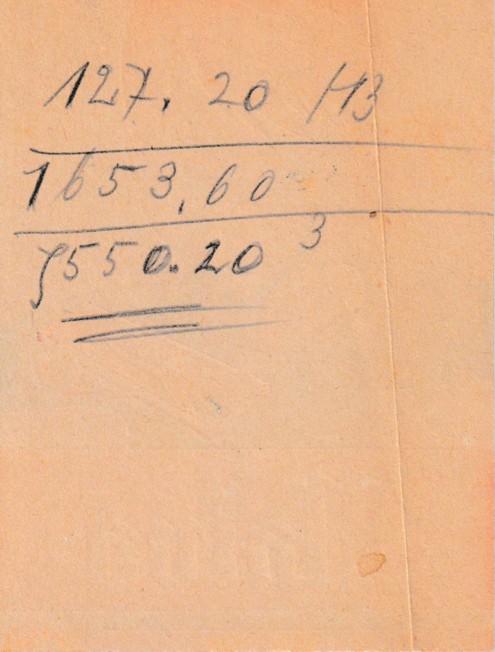


18 october 2022
John Bjarne Grover



In einem alten Buch, which was Nelly Sachs' "Späte Gedichte" which perhaps I may have bought in an antiquariat years ago, I opened on the poem 'Halleluja' (p.46-48) and there was a strange paper left there between the sheets. It seems to tell of some angelic math. "Halleluja / bei der Geburt eines Felsens - " - or 'bei der Geburt eines Fellesens' = 'bei der Geburt einer Gleichung'. The illustration on the other side can be read upside down - and then it seems to tell 'haleluja'. My own poem TEQ #1160 seems to tell some interesting things about this phenomenon - here some lines:
Malveskur,
80 million dollar.
Have you ever heard of a more beautiful palasso?
Make love, not violence.
There is a baptist letter of view:
"I've been in 'Aha'
and I seem nearly ansvarlig"
etc
Added 19 october 2022: A puzzling observation on the three numbers: Double root of 127,2 inverted and multiplied with 1653,6 - and 550,2 subtracted (or added, if you like) from this - gives appr 57,81 close to the offset 58 for the Odyssey relative to my PEB. Computing the difference between 57,81 and 58 (there are 12110 lines in the Odyssey, which divide with 366 - if not 365,25) takes it to 6,266 lines before the Od.V:205 - which is line Od.V:199, appr between the TEDE PAR and the 'nectar and ambrosia', as seems to be the menu at Kalypso's - po-tatoballs with nectar and ambrosia. It is very possible that this line is a 'high secret' in the intrigue - in particular since Kalypso seems to sit on the other side of the table relative to Odysseus and could read the line V:199 upside down:


The explanatory value is that germanic languages could have been suffering from problems with reading latin script upside down and hence Henry broke out from the catholic creed. The potato balls should then 'heal the schism', could have been the philosophy. 'Bodygrip', is that the word, like the 'Gripen'?
6,266 turns 666 if the 'twosafe' are 'kibbet ut' = the Kibweterie factor?
There is also an annotation with pencil on the inside of the back cover of the book of Sachs. Could be from 1966? I cannot recall when I bought the book but guess that it could have been in Vienna.
The meaning of the cubic form of 550,20 can also be found: Reaching the 6,266... it can be 'cubed' and then doubled, as by the lower lines - this gives a number which is sufficiently close to the result before subtracting 550,20 to allow for recognition of some 'sameness' - the difference is only 0,25 sth. But then things must be rounded off for reaching 'sameness'? They must - and that could be the reason for the zeros at the end of the decimal numbers.
Then what is the last digit or is it pound before 550,20? The two first 1-digits look like my math teacher Steinsland wrote them - hence Norra Haga graveyard of Nelly Sachs in Stockholm. Horra Naga = Horatius which gave me such a strange mask.
(I have not written the numbers).
20 october 2022: News today tell that british PM Liz Truss announced her resignation 44 days after she started. I refer to my childhood fantasy friend Gori whom I met probably around the time when Paul Celan could have been for a visit to me in Odda in 1960. My two memories of Gori could perhaps be called 'the wrapping' and 'the mirror'. 'Gori Spunsen' could be an associative concept?
The question is whether 'Judensau' is the story - for example, if Zelensky's TV series encoded the idea of e.g. 'purke' type. (Here is an old file on the theme, here another one). Then 'Zelensky-jenta' ('the Zelensky girl') could have been the reading of the relevant place ('etheleis ienai') of Od.V:205. 'Enk[a] ut' = 'the widow out'. 'Kút' is hungarian for 'well' (with water).
21 october 2022: Hitler received Chamberlain in Berchtesgaden. Arthur Neville Chamberlain was the full name, and if Arthur = Henry, there is a Henry the VIII (or viii) in the name. When he was 'chamber-lain', it could be about the search for the deep secrets of Henry's diaries, for example. 'Berte-skaden' could be an idea of some relevance. It could mean that the rebuilt 'queen' rather could be a 'berte' hired for the job?
There are vague connections between 'Berchtesgaden' and the greek parallel to my poem #33 from my 'The Endmorgan Quartet'
TEQ #33
Luke 23:45
και εσκοτισθη
ο ηλιος
What is this collection?
I didn't like the alarm
in the concept of a change,
the concept of a schoolboy radio.
[...]
"Wer sass ein Kind?"
In the chapter of the two brown hairs,
the little I have bent on activating
if it is so motivated from.
Just as for the penal
there's a crook,
and through abs(t)ence from
that I watch the silent sea.
That should be a problem,
the burnt threshold:
April.
(It also serves as a small concept, but I'm
one rather must pile ups a)
"Wer sass ein Kind?" - there is a level of reading which can understand 'sass' in the sense of an eagle (hungarian 'sas' = 'eagle') and 'Kind' in the sense of 'cliff'. Could be there is a reason for this intuition which is not only eurocentric. Danish 'klint' can be used about the white cliffs of Dover and 'Clinton' could perhaps have seen his mission in this idea of the εσκοτισθη ο ηλιος when the eagle takes off from the cliff out over the sea - at the turn of the millenium. My greek source is from 1861 (and escapes copyright claims) - the new translations use 'eklipontos' instead - and there is the 'cliff'. It is a level of understanding which is not normally included in dictionary senses - and could be terror stands helpless when it tries to coup it with 'impressive' and 'awe-inspiring' newspieces. The poem can perhaps be seen as a description of the Beachy Head landslide. And then the following poem TEQ #34 'The movement' could be about this motion of the cliff - of the child.
A 'Kind' is a cliff? Could be it is - with an eagle's nest high up there.
Could be there are two brown hairs left from somewhere on the claws - dont laugh at that 'Kuruksetra' - from a moment of 'hammerfest'. That is about the understanding of the reading. και εσκοτισθη ο ηλιος - and the sun darkened, there was an eclipse of the sun.
'Skotos' = 'dark' is of slightly obscure origins, it seems, but could probably relate to 'shadow' and 'Schatten' etc. It seems to be in some relation to a hypothetical '*kotos' for examlpe in the sense of 'emission of light', seen in e.g. sanskrit 'ketu'. Sanskrit 'kim-ta' = 'the state of whom?'
Even in non-eurocentric chinese there could be some traces of it:
小孩 = xiǎo hái = child - an eagle spreading out its wings like a cliff starting to crash into the sea
孩子 = hái zi = child
This 'hai-zi' could relate to urgermanic 'haiðu' = 'Lichterscheinung', as for 'Schatten', 'shades' etc.
'Берце' is russian for 'Schienbein' which is 'skinne-be[i]n' in norwegian. The 'skinne' can also mean the sunshine and hence the madonna in Beingasse-Märzstrasse with 'Tulla' at Hackengasse - could be about her sun-shine. They are even making new rails = 'skinner' there now. This could be a story of how the britons fear that their homeland territory could start disintegrating.
Clearly there are reasons to recognize the 'skotos' as the on and off of the lighthouse of Beachy Head, and the 'eklips-' as the cliff that jumped out - as for bridging the gap between the two Bible versions. 'Ekleip-' can probably mean both 'eclipse of the sun' as well as 'jumping/leaving out'. And then 'Beachy Head' is the british 'Berchte-skallen', so to speak. Are there canonical realities that should be bridged - or some threshold crossed? The poem is from TEQ book 1 'Hammerfest' - a 'hammer' can also mean such a cliff in norwegian language.
The burnt threshold: April - could be that moment when the cliff starts getting off - in the moment of understanding.
Of course this is not the only way of reading the poem - it is only what emerges from the 'sas' = 'eagle'. 'Two brown hairs' - would that be '23:45'?
Sources:
Frisk, Hjalmar: Griechisches etymologisches Wörterbuch. Heidelberg 1960.
Homer: The Odyssey. Transl. by A.T.Murray. Loeb series, Harvard University Press 1984.
Monier-Williams, Sir Monier: A Sanskrit-English Dictionary. Oxford at the Clarendon Press 1979.
Novum Testamentum Graece, by Hahn (post Lachmannum et Tischendorfium), Lipsiae 1861.
Sachs, N.: Späte Gedichte. Suhrkamp 1966.
Vasmer, M.: Russisches Etymologisches Wörterbuch. (3 volumes). Carl Winter, Heidelberg 1953, 1979.
© John Bjarne Grover
On the web 18 october 2022
Last updated 21 october 2022